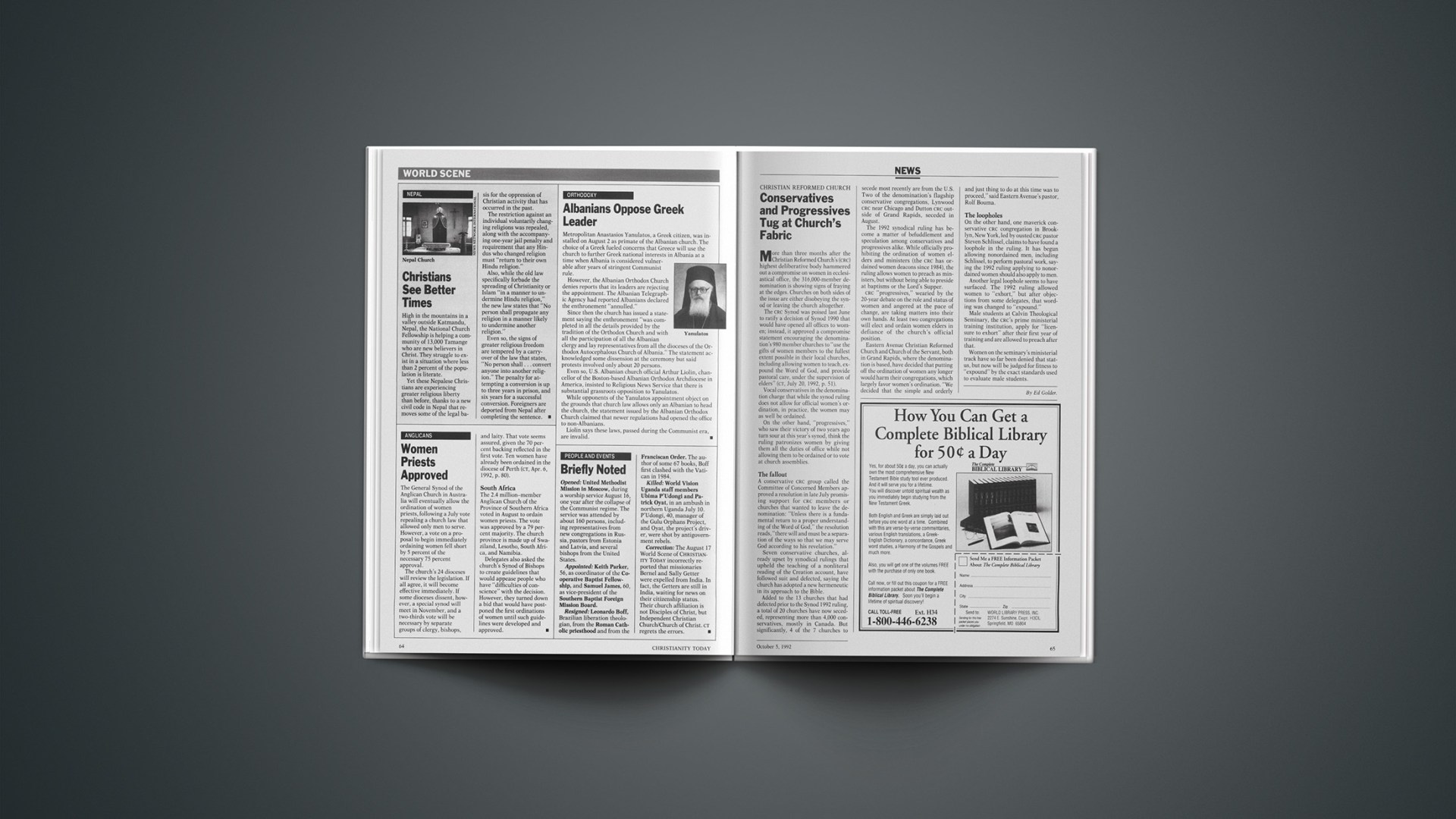More than three months after the Christian Reformed Church’s (CRC) highest deliberative body hammered out a compromise on women in ecclesiastical office, the 316,000-member denomination is showing signs of fraying at the edges. Churches on both sides of the issue are either disobeying the synod or leaving the church altogether.
The CRC Synod was poised last June to ratify a decision of Synod 1990 that would have opened all offices to women; instead, it approved a compromise statement encouraging the denomination’s 980 member churches to “use the gifts of women members to the fullest extent possible in their local churches, including allowing women to teach, expound the Word of God, and provide pastoral care, under the supervision of elders” (CT, July 20, 1992, p. 51).
Vocal conservatives in the denomination charge that while the synod ruling does not allow for official women’s ordination, in practice, the women may as well be ordained.
On the other hand, “progressives,” who saw their victory of two years ago turn sour at this year’s synod, think the ruling patronizes women by giving them all the duties of office while not allowing them to be ordained or to vote at church assemblies.
The Fallout
A conservative CRC group called the Committee of Concerned Members approved a resolution in late July promising support for CRC members or churches that wanted to leave the denomination: “Unless there is a fundamental return to a proper understanding of the Word of God,” the resolution reads, “there will and must be a separation of the ways so that we may serve God according to his revelation.”
Seven conservative churches, already upset by synodical rulings that upheld the teaching of a nonliteral reading of the Creation account, have followed suit and defected, saying the church has adopted a new hermeneutic in its approach to the Bible.
Added to the 13 churches that had defected prior to the Synod 1992 ruling, a total of 20 churches have now seceded, representing more than 4,000 conservatives, mostly in Canada. But significantly, 4 of the 7 churches to secede most recently are from the U.S. Two of the denomination’s flagship conservative congregations, Lynwood CRC near Chicago and Dutton CRC outside of Grand Rapids, seceded in August.
The 1992 synodical ruling has become a matter of befuddlement and speculation among conservatives and progressives alike. While officially prohibiting the ordination of women elders and ministers (the CRC has ordained women deacons since 1984), the ruling allows women to preach as ministers, but without being able to preside at baptisms or the Lord’s Supper.
CRC “progressives,” wearied by the 20-year debate on the role and status of women and angered at the pace of change, are taking matters into their own hands. At least two congregations will elect and ordain women elders in defiance of the church’s official position.
Eastern Avenue Christian Reformed Church and Church of the Servant, both in Grand Rapids, where the denomination is based, have decided that putting off the ordination of women any longer would harm their congregations, which largely favor women’s ordination. “We decided that the simple and orderly and just thing to do at this time was to proceed,” said Eastern Avenue’s pastor, Rolf Bouma.
The Loopholes
On the other hand, one maverick conservative CRC congregation in Brooklyn, New York, led by ousted CRC pastor Steven Schlissel, claims to have found a loophole in the ruling. It has begun allowing nonordained men, including Schlissel, to perform pastoral work, saying the 1992 ruling applying to nonordained women should also apply to men.
Another legal loophole seems to have surfaced. The 1992 ruling allowed women to “exhort,” but after objections from some delegates, that wording was changed to “expound.”
Male students at Calvin Theological Seminary, the CRC’s prime ministerial training institution, apply for “licensure to exhort” after their first year of training and are allowed to preach after that.
Women on the seminary’s ministerial track have so far been denied that status, but now will be judged for fitness to “expound” by the exact standards used to evaluate male students.
By Ed Golder.










